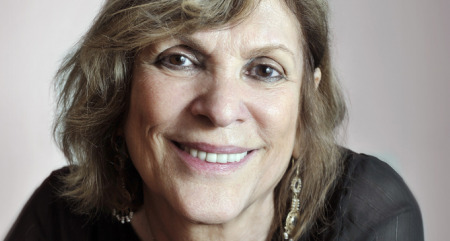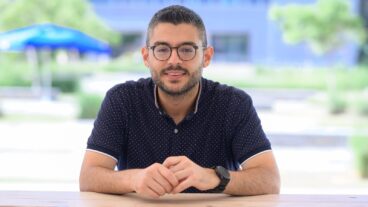Israeli-American psychologist Dr. Edna Foa, honored by Time Magazine as one of the most influential people in 2010, is healing traumatized war veterans in the US and Israel.

Eight percent of all Americans will experience Post Traumatic Stress Disorder (PTSD) at some point in their lives. An unhealthy response to trauma, PTSD may be triggered by combat, a car crash, a near-fatal accident, by rape or by emotional abuse. People with PTSD tend to bury the event rather than deal with it, world expert Dr. Edna Foa, an Israeli-American psychologist, tells ISRAEL21c.
In the US, an estimated half a million war veterans from Vietnam, and now another 300,000 from Afghanistan and Iraq, suffer from PTSD. If they’re lucky, half of them can expect to see faster recoveries from their trauma thanks to a method developed by Foa, professor of clinical psychology in psychiatry at the University of Pennsylvania and director of the Center for the Treatment and Study of Anxiety.
In the psychology business since completing her first degree in Psych and Lit at Israel’s Bar Ilan University in 1962, Foa has nearly 50 years of experience, practice and success with novel treatment methods to help people with obsessive compulsive disorders and PTSD in the US and around the world. That dedication earned her a place on the TIME Magazine 2010 list of the world’s most influential people.
Foa reckons that the American-based magazine’s award is primarily in recognition of her work with the US Department of Veteran Affairs, where she has set up a self-sustaining treatment program to heal the country’s war veterans, past and present.
Gradual exposure to the pain
Her treatment methodology, called PE (for Prolonged Exposure), is one of two major approaches used by clinicians in the US to treat veterans with PTSD, she says. Sufferers were affected in America’s war in Vietnam, or are relative ‘newcomers’ to the syndrome, having experienced their traumas in Afghanistan or Iraq.
Through PE, Foa helps the patient to focus on the thoughts and feelings that elicit the highest levels of fear, and then works with them to enable them to confront those fears, moving gradually from the minor to the major terrors. Sometimes it’s as deceptively simple as re-learning to listen to the radio. The methodology also involves helping patients to identify their fears and recognize the events that caused the trauma. The reason why people suffer from PTSD, she says, is that they don’t relate to their memories appropriately, but rather continue to re-experience them.

“I had one patient who was raped by eight people, people who she knew, and in her mind she thought that if only she’d told them she didn’t enjoy it, they wouldn’t have done it,” says Foa. “Through focus and concentration on the event she could remember with emotions and thoughts; and eventually recalled how much she fought against them. Her sense of guilt diminished and she allowed herself to remember.” And to be treated.
Between 80 and 85 percent of the people who are treated with PE go into remission for PTSD, she says. Foa also treats people who’ve been living with PTSD for decades: “There are many people like this,” she tells ISRAEL21c. “People who were in Vietnam and in the system for 30 years without much gain, and within 10 to 15 sessions [with PE] regained their lives,” she reports. These successes occurred in both the US and Israel. “I know some of these people closely,” she adds.
Foa has published about 20 books on the topic, including manuals for clinicians on how to use her novel therapy, and manuals for patients explaining how to derive maximum benefit from the treatment. She has also penned more than 100 papers in scientific journals reporting on the successes, patterns and approaches for treating PTSD.
The psychologist is not the only Israeli to be singled out as a TIME Magazine influential in recent years. The algae-for-fuel pioneer Isaac Berzin, Benjamin Kahn, the founder of the water protection NGO Zalul, and Gidon Bromberg one of the heads of the eco-activism water group Friends of the Earth Middle East (FOEME) in Israel have all been added to the prestigious list. Bromberg and the other two FOEME’s co-directors were honored by TIME Magazine as Heroes of the Environment 2008.
The Israel connection
The new treatment was sparked by violence and conflict in Israel. Teaching at the University of Pennsylvania, during a visit back to Israel in 2000 at the start of the second intifada (the violent Palestinian uprising characterized by numerous terrorist attacks, which began late in 2000), Foa refined her treatment method.
By that time she was collaborating with Israeli researchers, one from Bar Ilan University in Ramat Gan and two from the Hebrew University of Jerusalem. Foa and her American husband, who teaches ancient philosophy at the University of Pennsylvania, live near Philadelphia for 10 months of the year, but pay two month-long, annual visits to Israel. Foa tells ISRAEL21c that during those visits she collaborates with her partners, write papers and visits relatives. Her three children live in the US.
Born in Haifa, she was only 10 when her brother was killed in battle, during the 1948 war when Israel was struggling to define itself as a state. As her family’s only remaining child she was exempted from army service and went straight to university after completing high school. Soon after, she moved to the US.
After graduating with a PhD from Colombia University she started out working in the field of obsessive compulsive disorders: “I started with obsessive compulsion disorders then moved to trauma in understanding how people overcome distress and stressful experiences,” she says.
In Israel, where about 500 clinicians have been trained in PE, Foa works with the military and the Ministry of Defense, teaching psychotherapists how to treat traumatized soldiers. In the Veterans system in the US, around 1,200 clinicians have learned her methods and teach them to others.












